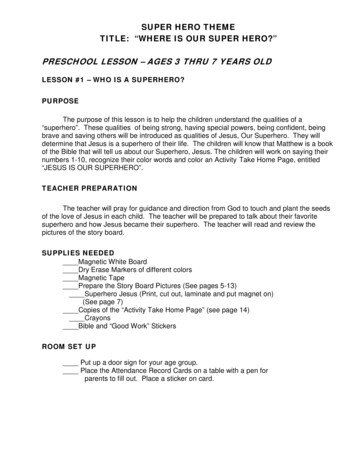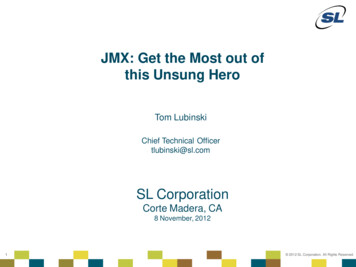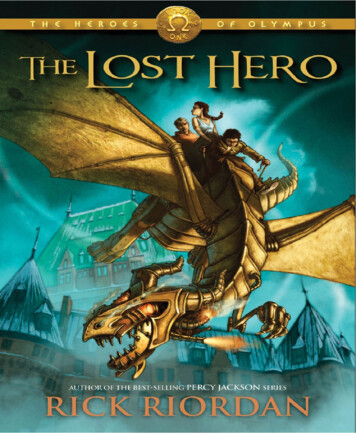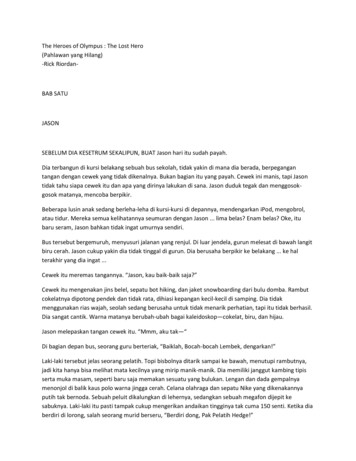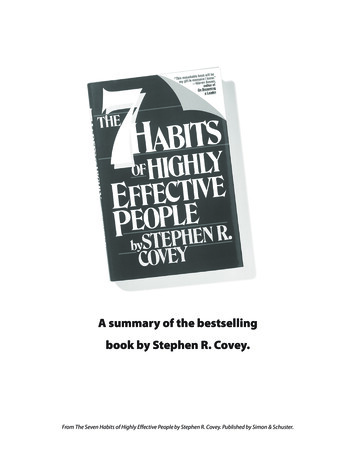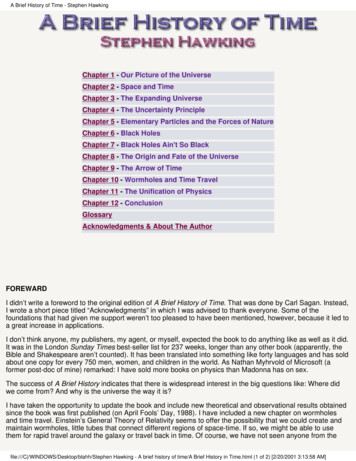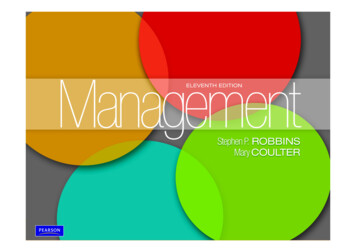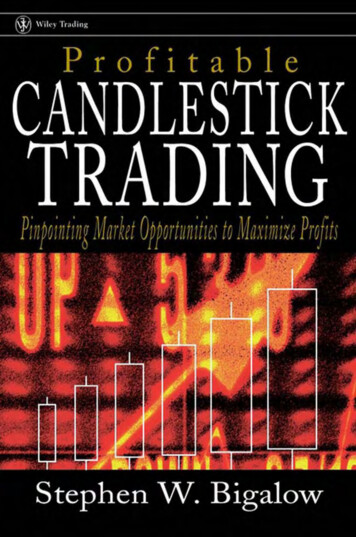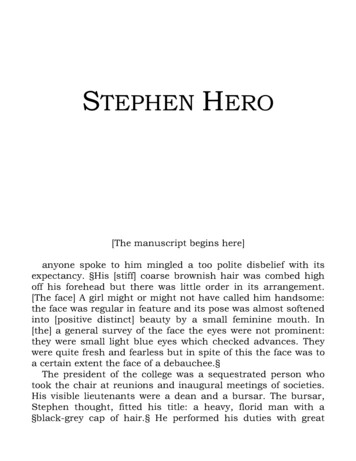
Transcription
STEPHEN HERO[The manuscript begins here]anyone spoke to him mingled a too polite disbelief with itsexpectancy. §His [stiff] coarse brownish hair was combed highoff his forehead but there was little order in its arrangement.[The face] A girl might or might not have called him handsome:the face was regular in feature and its pose was almost softenedinto [positive distinct] beauty by a small feminine mouth. In[the] a general survey of the face the eyes were not prominent:they were small light blue eyes which checked advances. Theywere quite fresh and fearless but in spite of this the face was toa certain extent the face of a debauchee.§The president of the college was a sequestrated person whotook the chair at reunions and inaugural meetings of societies.His visible lieutenants were a dean and a bursar. The bursar,Stephen thought, fitted his title: a heavy, florid man with a§black-grey cap of hair.§ He performed his duties with great
unction and was often to be seen looming in the hallwatching the coming and going of the students. He insistedon punctuality: a minute or so late once or twice - he wouldnot mind that so much; he would clap his hands and makesome cheery reproof. But what made him severe was a fewminutes lost every day: it disturbed the proper working of theclasses. Stephen was nearly always more than a quarter of anhour late and [so] when he arrived the bursar had usuallygone back to his office. One morning, however, he arrived atthe school earlier than usual. Walking up the steps beforehim was a fat [young] student, a very hard-working, timorousyoung man with a bread-and-jam complexion. The bursarwas standing in the hall with his arms folded across [the] hischest and when he caught sight of the fat young man helooked significantly at the clock. It was eight minutes pasteleven.-Now then, Moloney, you know this won't do. Eight minuteslate! Disturbing your class like that - we can't have that, youknow. Must be in sharp for lectures every morning in future.The jam overspread the bread in Moloney's face as hestumbled over some excuses about a clock being wrong andthen scurried upstairs to his class. Stephen delayed a little[while] time hanging up his overcoat while the large priest eyedhim solemnly. Then he turned his head quietly towards thebursar and said:-Fine morning, sir.The bursar at once clapped his hands and rubbed themtogether and clapped them together again. The beauty of themorning and the appositeness of the remark both struck him atthe same time and he answered cheerily:-Beautiful! Fine bracing morning now! and he fell to rubbinghis hands again.One morning [he] Stephen arrived three quarters of an hourlate and he thought it his decenter plan to wait till the Frenchlecture should begin. As he was leaning over the banisters,waiting for the twelve o'clock bell to ring a young man began to
ascend the winding stairs slowly. At a few steps from the landinghe halted and turned a square rustic face towards Stephen.-Is this the way to the Matriculation class, if you please, heasked in a brogue accenting the first syllable of Matriculation.Stephen directed him and the two young men began to talk.The new student was named Madden and came from the countyof Limerick. His manner without being exactly diffident was alittle scared and he seemed grateful for Stephen's attentions.After the French lecture the two walked across the greentogether and Stephen brought the newcomer into the NationalLibrary. Madden took off his hat at the turnstile and as heleaned on the counter to fill up the docket for his book Stephenremarked the peasant strength of his jaws.The dean of the college was professor of English, Father Butt.He was reputed the most able man in the college: he was aphilosopher and a scholar. He read a series of papers at a totalabstinence club to prove that Shakespeare was a RomanCatholic: he had also written against another Jesuit father whohad very late in life been converted to the Baconian theory ofthe authorship of the plays. Father Butt had always his handsfull of papers and his soutane very soiled with chalk. He was anelderly greyhound of a man and his vocal ligaments, like hisgarb, seemed to be coated with chalk. He had a plausiblemanner with everyone and was particularly[two pages missing]of verse are the first conditions which the words must submitto, the rhythm is the esthetic result of the senses, values andrelations of the words thus conditioned. The beauty of verseconsisted as much in the concealment as in the revelation ofconstruction but it certainly could not proceed from only one ofthese. For this reason he found Father Butt's reading of verseand a schoolgirl's accurate reading of verse intolerable. Verse tobe read according to its rhythm should be read according to thestresses; that is, neither strictly according to the feet nor yet
with complete disregard of them. All this theory he set himselfto explain to Maurice and Maurice, when he had understood themeanings of the terms and had put these meanings carefullytogether, agreed that Stephen's theory was the right one. Therewas only one possible way of rendering the first quatrain ofByron's poem:My days are in the yellow leafThe flowers and fruits of love are goneThe worm, the canker and the griefAre mine alone.The two brothers tried this theory on all the verse they couldremember and it yielded wonderful results. Soon Stephenbegan to explore the language for himself and to choose, andthereby rescue once for all, the words and phrases mostamenable to his theory. §He became a poet with maliceaforethought. §He was at once captivated by the seeming eccentricities of theprose of Freeman and William Morris. He read them as onewould read a thesaurus and made a §garner§ of words. He readSkeat's Etymological Dictionary by the hour and his mind,which had from the first been only too submissive to the infantsense of wonder, was often hypnotized by the mostcommonplace conversation. People seemed to him strangelyignorant of the value of the words they used so glibly. And paceby pace as this indignity of life forced itself upon him he becameenamoured of an idealizing, a more veritable human tradition.The phenomenon seemed to him a grave one and he began tosee that people had leagued themselves together in a conspiracyof ignobility and that Destiny had scornfully reduced her pricesfor them. He desired no such reduction for himself andpreferred to serve her on the ancient terms.There was a special class for English composition and it wasin this class that Stephen first made his name. The Englishessay was for him the one serious work of the week. His essay
was usually very long and the professor, who was a leaderwriter on the Freeman's Journal, always kept it for the last.Stephen's style of writing, [that] though it was over affectionatetowards the antique and even the obsolete and too easilyrhetorical, was remarkable for a certain crude originality ofexpression. He gave himself no great trouble to sustain theboldnesses which were expressed or implied in his essays. Hethrew them out as sudden defence-works while he was busyconstructing the enigma of a manner. For the youth had beenapprised of another crisis and he wished to make ready for theshock of it. On account of such manoeuvres he came to beregarded as a very unequilibrated [youth] young man who tookmore interest than young men usually take in theories whichmight be permitted as pastimes. Father Butt, to whom theemergence of these unusual qualities had been duly reported,spoke one day to Stephen with the purpose of 'sounding' him.Father Butt expressed a great admiration for Stephen's essaysall of which, he said, the professor of English composition hadshown him. He encouraged the youth and suggested that in ashort time perhaps he might contribute something to one of gement kindly meant but mistaken and he launchedforth into a copious explanation of his theories. Father Buttlistened and, even more readily than [Stephen] Maurice haddone, agreed with them all. Stephen laid down his doctrine verypositively and insisted on the importance of what he called theliterary tradition. §Words, he said, have a certain value in theliterary tradition and a certain value in the market-place - adebased value.§ Words are simply receptacles for humanthought: in the literary tradition they receive more valuablethoughts than they receive in the market-place. Father Buttlistened to all this, rubbing his chalky hand often over his chinand §nodding his head and said that Stephen evidentlyunderstood the importance of tradition.§ Stephen quoted aphrase from Newman to illustrate his theory.-In that sentence of Newman's, he said, the word is used
according to the literary tradition: it has there its full value. Inordinary use, that is, in the market-place, it has a differentvalue altogether, a debased value. 'I hope I'm not detaining you.'-Not at all, not at all!-No, no .-Yes, yes, Mr Daedalus, I see . I quite see your point .detain .The very morning after this Father Butt returned Stephen'smonologue in kind. It was a raw nipping morning and whenStephen, who had arrived too late for the Latin lecture, strolledinto the Physics Theatre he discovered Father Butt kneeling onthe hearthstone engaged in lighting a small fire in the hugegrate. He was making neat wisps of paper and carefullydisposing them among the coals and sticks. All the while hekept up a little patter explaining his operations and at a crisishe produced from the most remote pockets of his chalkysoutane three dirty candle-butts. These he thrust in differentopenings and then looked up at Stephen with an air of triumph.He set a match to a few projecting pieces of paper and in a fewminutes the coals had caught.-There is an art, Mr Daedalus, in lighting a fire.-So I see, sir. A very useful art.-That's it: a useful art. We have the useful arts and we havethe liberal arts.Father Butt after this statement got up from the hearthstoneand went away about some other business leaving Stephen towatch the kindling fire and Stephen brooded upon the fastmelting candle-butts and on the reproach of the priest's mannertill it was time for the Physics lecture to begin.The problem could not be solved out of hand but the artisticpart of it at least presented no difficulties. In reading throughTwelfth Night for the class Father Butt skipped the two songs ofthe clown without a word and when Stephen, determined onforcing them on his attention, asked very gravely whether theywere to be learned by heart or not Father Butt said it wasimprobable such a question would be on the paper:
-The clown sings these songs for the duke. It was a custom atthat time for noblemen to have clowns to sing to them . foramusement.He took Othello more seriously and made the class take anote of the moral of the play: an object lesson in the passion ofjealousy. Shakespeare, he said, had sounded the depths ofhuman nature: his plays show us men and women under theinfluence of various passions and they show us the moral resultof these passions. We see the conflict of these human passionsand our own passions are purified by the spectacle. The dramasof Shakespeare have a distinct moral force and Othello is one ofthe greatest of tragedies. Stephen trained himself to hear allthis out without moving hand or foot but at the same time hewas amused to learn that the president had refused to allow twoof the boarders to go §to a performance of Othello at the GaietyTheatre on the ground that there were many coarse expressionsin the play.§The monster in Stephen had lately taken to misbehavinghimself and on the least provocation was ready for bloodshed.Almost every incident of the day was a goad for him and theintellect had great trouble keeping him within bounds. But theepisode of religious fervour which was fast becoming a memoryhad resulted in a certain outward self-control which was nowfound to be very useful. Besides this Stephen was quick enoughto see that he must disentangle his affairs in secrecy and reservehad always been a light penance for him. His reluctance to debatescandal, to seem impolitely curious of others, aided him in hisreal indictment and was not without a satisfactory flavour of theheroic. Already while that fever-fit of holiness lay upon him hehad encountered but out of charity had declined to penetratedisillusioning forces. These shocks had driven him frombreathless flights of zeal shamefully inwards and the most thatdevotional exercises could do for him was to soothe him. Thissoothing he badly needed for he suffered greatly from contactwith his new environment. He hardly spoke to his colleagues andperformed the business of the class without remark or interest.
Every morning he rose and came down to breakfast. Afterbreakfast he took the tram for town, settling himself on thefront seat outside with his face to the wind. He got down off thetram at Amiens St Station instead of going on to the Pillarbecause he wished to partake in the morning life of the city.This morning walk was pleasant for him and there was no facethat passed him on its way to its commercial prison but hestrove to pierce to the motive centre of its ugliness. It wasalways with a feeling of displeasure that he entered the Greenand saw on the far side the gloomy building of the college.As he walked thus through the ways of the city he had hisears and eyes ever prompt to receive impressions. It was notonly in Skeat that he found words for his treasure-house, hefound them also at haphazard in the shops, on advertisements,in the mouths of the plodding public. He kept repeating them tohimself till they lost all instantaneous meaning for him andbecame wonderful vocables. He was determined to fight withevery energy of soul and body against any possible consignmentto what he now regarded as the hell of hells -- the region,otherwise expressed, wherein everything is found to be obvious- and the saint who formerly was §chary of speech§ in obedienceto a commandment of silence could just be recognized in theartist who schooled himself to silence lest words should returnhim his discourtesy. Phrases came to him asking to havethemselves explained. He said to himself: I must wait for theEucharist to come to me: and then he set about translating thephrase into common sense. He spent days and nightshammering noisily as he built a house of silence for himselfwherein he might await his Eucharist, days and nights gatheringthe first fruits and every peace-offering and heaping them uponhis altar whereon he prayed clamorously the burning token ofsatisfaction might descend. In class, in the hushed library, inthe company of other students he would suddenly hear acommand to begone, to be alone, a voice agitating the verytympanum of his ear, a flame leaping into divine cerebral life. Hewould obey the command and wander up and down the streets
alone, the fervour of his hope sustained by ejaculations until hefelt sure that it was useless to wander any more: and then hewould return home with a deliberate, unflagging step piecingtogether meaningless words and phrases with deliberateunflagging seriousness.
XVITheir Eminences of the Holy College are hardly morescrupulous solitaries during the ballot for Christ's vicar thanwas Stephen at this time. He wrote a great deal of verse and, indefault of any better contrivance, his verse allowed him tocombine the offices of penitent and confessor. He sought in hisverses to fix the most elusive of his moods and he put his linestogether not word by word but letter by letter. He read Blakeand Rimbaud on the values of letters and even permuted andcombined the five vowels to construct cries for primitiveemotions. To none of his former fervours had he given himselfwith such a whole heart as to this fervour; §the monk nowseemed to him no more than half the artist. He persuadedhimself that it is necessary for an artist to labour incessantly athis art if he wishes to express completely even the simplestconception and he believed that every moment of inspiration
must be paid for in advance. He was not convinced of the truthof the saying [ Poeta nascitur, non fit ] 'The poet is born, notmade' but he was quite sure of§ the truth of this at least: [Poema fit, non nascitur ] 'The poem is made, not born.' Theburgher notion of the poet Byron in undress pouring out verses[like] just as a city fountain pours out water seemed to himcharacteristic of most popular judgments on esthetic mattersand he combated the notion at its root §by saying solemnly toMaurice - Isolation is the first principle of artistic economy.§Stephen did not attach himself to art in any spirit ofyouthful dilettantism but strove to pierce to the significantheart of everything. §He doubled backwards into the past ofhumanity and caught glimpses of emergent art as one mighthave a vision of the plesiosaurus emerging from his ocean ofslime. He seemed almost to hear the simple cries of fear andjoy and wonder which are antecedent to all song, the savagerhythms of men pulling at the oar,§ to see the rude scrawlsand the portable gods of men whose legacy Leonardo andMichaelangelo inherit. And over all this chaos of history andlegend, of fact and supposition, he strove to draw out a line oforder, to reduce the abysses of the past to order by adiagram. The treatises which were recommended to him hefound valueless and trifling; the Laocoon of Lessing irritatedhim. He wondered how the world could accept as valuablecontributions such [fantas] fanciful generalizations. Whatfiner certitude could be attained by the artist if he believedthat ancient art was plastic and that modern art was pictorial- ancient art in this context meaning art between the Balkansand the Morea and modern art meaning anywhere betweenthe Caucasus and the Atlantic except in the sacrosanctregion. A great contempt devoured him for the critics whoconsidered 'Greek' and 'classical' interchangeable terms andso full was he of intemperate anger that [all week Saturday]when Father Butt gave Othello as the subject for the essay ofthe week Stephen lodged on the following Monday a profuse,downright protest against the 'masterpiece'! The young men
in the class laughed and Stephen, as he lookedcontemptuously at the laughing faces, thought of a selfsubmersive reptile.No-one would listen to his theories: no-one was interested inart. The §young men in the college§ regarded art as acontinental vice and they said in effect, 'If we must have art arethere not enough subjects in Holy Writ?' - for an artist withthem was a man who painted pictures. It was a bad sign for ayoung man to show interest in anything but his examinationsor his prospective 'job'. It was all very well to be able to talkabout it but really art was all 'rot': besides it was probablyimmoral; they knew (or, at least, they had heard) about studios.They didn't want that sort of thing in their country. Talk aboutbeauty, talk about rhythms, talk about esthetic - they knewwhat all the fine talk covered. One day a big countrified studentcame over to Stephen and asked:-§Tell us, aren't you an artist?Stephen gazed at the idea-proof young man, withoutanswering.-Because if you are why don't you wear your hair long?§A few bystanders laughed at this and Stephen wondered forwhich of the learned professions the young man's fatherdesigned him.In spite of his surroundings Stephen continued his labours ofresearch and all the more ardently since he imagined they hadbeen §put under ban.§ It was part of that ineradicable egoismwhich he was afterwards to call redeemer that he conceivedconverging to him the deeds and thoughts of his microcosm. Isthe mind of youth medieval that it is so divining of intrigue?Field-sports (or their equivalent in the world of mentality) areperhaps the most effective cure and Anglo-Saxon educatorsfavour rather a system of hardy brutality. But for this fantasticidealist, eluding the grunting booted apparition with a bound,the mimic warfare was no less ludicrous than unequal in aground chosen to his disadvantage. Behind the rapidlyindurating shield the sensitive answered: Let the pack of
enmities come tumbling and sniffing to my highlands after theirgame. There was his ground and he flung them disdain fromflashing antlers.Indeed he felt the morning in his blood: he was aware of somemovement already proceeding §out in Europe.§ Of this lastphrase he was fond for it seemed to him to unroll themeasurable world before the feet of the islanders. Nothing couldpersuade him that the world was such as Father Butt'sstudents conceived it. He had no need for the cautions whichwere named indispensable, no reverence for the proprietieswhich were called the bases of life. He was an enigmatic figurein the midst of his shivering society where he enjoyed areputation. His comrades hardly knew how far to venture withhim and professors pretended to think his seriousness asufficient warrant against any practical disobedience. On hisside chastity, having been found a great inconvenience, hadbeen quietly abandoned and the youth amused himself in thecompany of certain of his fellow-students among whom (as thefame went) wild living was not unknown. The Rector ofBelvedere had a brother who was at this time a student in thecollege and one night in the gallery of the Gaiety (for Stephenhad become a constant 'god') another Belvedere boy, §who wasalso a student in the college, bore scandalous witness intoStephen's ear.§-I say, Daedalus .-Well?-I wonder what MacNally would say if he met his brother you know the fellow in the college?-Yes .
-I saw him in Stephen's Green the other day with a tart. I wasjust thinking if MacNally saw him .The informant paused: and then, afraid of over-implicationand with the air of a connoisseur, he added seriously:-Of course she was . all right.Every evening after tea Stephen left his house and set out forthe city, Maurice at his side. The elder smoked cigarettes andthe younger ate lemon drops and, aided by these animalcomforts, they beguiled the long journey with philosophicdiscourse. Maurice was a very attentive person and one eveninghe told Stephen that he was keeping a diary of theirconversations. Stephen asked to see the diary but Maurice saidit would be time enough for that at the end of the first year.Neither of the youths had the least suspicion of themselves;they both looked upon life with frank curious eyes (Mauricenaturally serving himself with Stephen's vision when his ownwas deficient) and they both felt that it was possible to arrive ata sane understanding of so-called mysteries if one only hadpatience enough. On their way in every evening the heights ofargument were traversed and the younger boy aided the elderbravely in the building of an entire science of esthetic. Theyspoke to each other very decisively and Stephen found Mauricevery useful for raising objections. When they came to the gate ofthe Library they used to stand to finish some branch of theirsubject and often the discussion was so protracted thatStephen would decide that it was too late to go in to read and sothey would set their faces for Clontarf and return in the samemanner. Stephen, after certain hesitations, showed Maurice thefirst-fruits of his verse and Maurice asked who the woman was.Stephen looked a little vaguely before him before answering andin the end had to answer that he didn't know who she was.To this unknown verses were now regularly inscribed and itseemed that the evil dream of love which Stephen chose tocommemorate in these verses lay veritably upon the world nowin a season of §damp violet mist. He had abandoned hisMadonna,§ he had forsaken his word and he had withdrawn
sternly from his little world and surely it was not wonderful thathis solitude should propel him to frenetic outbursts of a youngman's passion and to outbursts of loneliness? The quality of themind which so reveals itself is called (when incorrigible) adecadence but if we are to take a general view of [life] the worldwe cannot but see a process to life through corruption. Therewere moments for him, however, when such a process wouldhave seemed intolerable, life on any common terms anintolerable offence, and at such moments he prayed for nothingand lamented for nothing but he felt with a sweet sinking ofconsciousness that if the end came to him it was in the arms ofthe unknown that it would come to him:§The dawn awakes with tremulous alarms,How grey, how cold, how bare!O, hold me still white arms, encircling arms!And hide me, heavy hair!Life is a dream, a dream. The hour is doneAnd antiphon is said.We go from the light and falsehood of the sunTo bleak wastes of the dead.§Little by little Stephen became more irregular in hisattendances at the college. He would leave his house everymorning at the usual hour and come into the city on the tram.But always at Amiens St Station he would get down and walk andas often as not he would decide to follow some trivial indication ofcity life instead of entering the oppressive life of the college. Heoften walked thus for seven or eight hours at a stretch withoutfeeling in the least fatigued. The damp Dublin winter seemed toharmonize with his inward sense of unreadiness and he did notfollow the least of feminine provocations through tortuous,unexpected ways any more zealously than he followed throughways even less satisfying the nimble movements of the elusiveone. What was that One: arms of love that had not love'smalignity, laughter running upon the mountains of the
morning, an hour wherein might be encountered theincommunicable? And if the heart but trembled an instant atsome approach to that he would cry, youthfully, passionately, 'Itis so! It is so! Life is such as I conceive it.' He spurned frombefore him the stale maxims of the Jesuits and he swore anoath that [never] they should never establish over him anascendancy. He spurned from before him a world of the higherculture in which there was neither scholarship nor art nordignity of manners - a world of trivial intrigues and trivialtriumphs. Above all he spurned from before him the company of[the] decrepit youth - and he swore an oath that never wouldthey establish with him a compact of fraud. Fine words! fineoaths! crying bravely and passionately even in the teeth ofcircumstances. For not infrequently in the pauses of raptureDublin would lay a sudden hand upon his shoulder, §and thechill of the summons would strike to his heart. One day hepassed on his homeward journey through Fairview. At the forkof the roads before the swampy beach a big dog was recumbent.From time to time he lifted his muzzle in the vaporous air,uttering a prolonged sorrowful howl.§ People had gathered onthe footpaths to hear him. [and] Stephen made one of them tillhe felt the first drops of rain, and then he continued his way insilence under the dull surveillance of heaven, hearing from timeto time behind him the strange lamentation.It was natural that the more the youth sought solitude forhimself the more his society sought to prevent his purpose.Though he was still in his first year he was considered apersonality and there were even many who thought that thoughhis theories were a trifle ardent they were not without meaning.Stephen came seldom to lectures, prepared nothing andabsented himself from term examinations and not merely wasno remark passed on these extravagances but it was supposedprobable that he represented really the artistic type and that hewas, after the fashion of that little known tribe, educatinghimself. It must not be supposed that the popular University ofIreland lacked an intelligent centre. Outside the compact body
of national §revivalists there were here and there students whohad certain ideas of their own and were more or less toleratedby their fellows.§ For instance there was a serious youngfeminist named McCann - a blunt brisk figure, wearing aCavalier beard and shooting-suit, and a steadfast reader of theReview of Reviews. The students of the college did notunderstand what manner of ideas he favoured and theyconsidered that they rewarded his originality sufficiently bycalling him 'Knickerbockers'. There was also the College orator a most amenable young man who spoke at all meetings. Cranlytoo was a personality and Madden had soon been recognized asthe §spokesman§ of the patriotic party. Stephen may be said tohave occupied the position of notable-extraordinary: very fewhad ever heard of the writers he was reported to read and thosewho had knew them to be mad fellows. At the same time asStephen's manner was so unbending to all it was supposed thathe had preserved his sanity entire and safely bravedtemptations. People began to defer to him, to invite him to theirhouses and to present serious faces to him. His were simplytheories and, as he had as yet committed no breach of the law,he was respectfully invited to read a paper before the Literaryand Historical Society of the college. The date was fixed for theend of March and the title of the paper was announced as'Drama and Life'. Many risked the peril of rebuff to engage theyoung eccentric in talk but Stephen preserved a disdainfulsilence. One night as he was returning from a party a reporterof one of the Dublin papers, who had been introduced thatevening to the prodigy, approached him and after a fewexchanges said to him tentatively:-I was reading of that writer . what's this you call him .Maeterlinck the other day . you know?-Yes .-I was reading, The Intruder I think was the name of it .Very . curious play .Stephen had no wish to talk to the man about Maeterlinckand on the other hand he did not like to offend by the silence
which the remark and the tone and the intention all seemed todeserve so he cast about quickly in his mind for somenoncommittal banality with which to pay the debt. At last he said:-It w
minutes lost every day: it disturbed the proper working of the classes. Stephen was nearly always more than a quarter of an hour late and [so] when he arrived the bursar had usually gone back
